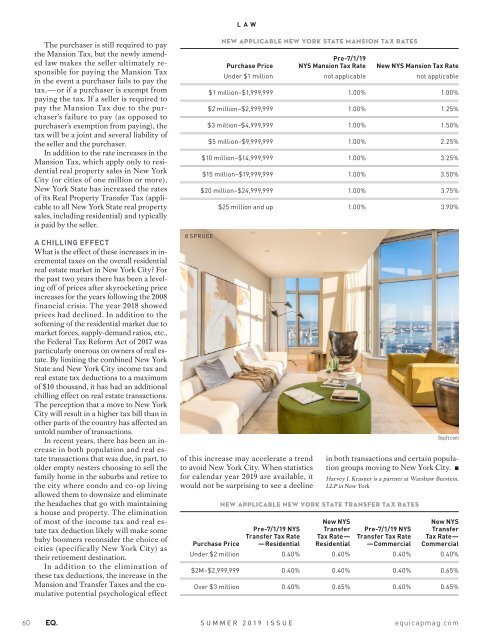EQ. Magazine Summer Issue 2019
Create successful ePaper yourself
Turn your PDF publications into a flip-book with our unique Google optimized e-Paper software.
LAW<br />
The purchaser is still required to pay<br />
the Mansion Tax, but the newly amended<br />
law makes the seller ultimately responsible<br />
for paying the Mansion Tax<br />
in the event a purchaser fails to pay the<br />
tax,—or if a purchaser is exempt from<br />
paying the tax. If a seller is required to<br />
pay the Mansion Tax due to the purchaser’s<br />
failure to pay (as opposed to<br />
purchaser’s exemption from paying), the<br />
tax will be a joint and several liability of<br />
the seller and the purchaser.<br />
In addition to the rate increases in the<br />
Mansion Tax, which apply only to residential<br />
real property sales in New York<br />
City (or cities of one million or more),<br />
New York State has increased the rates<br />
of its Real Property Transfer Tax (applicable<br />
to all New York State real property<br />
sales, including residential) and typically<br />
is paid by the seller.<br />
A CHILLING EFFECT<br />
What is the effect of these increases in incremental<br />
taxes on the overall residential<br />
real estate market in New York City? For<br />
the past two years there has been a leveling<br />
off of prices after skyrocketing price<br />
increases for the years following the 2008<br />
financial crisis. The year 2018 showed<br />
prices had declined. In addition to the<br />
softening of the residential market due to<br />
market forces, supply-demand ratios, etc.,<br />
the Federal Tax Reform Act of 2017 was<br />
particularly onerous on owners of real estate.<br />
By limiting the combined New York<br />
State and New York City income tax and<br />
real estate tax deductions to a maximum<br />
of $10 thousand, it has had an additional<br />
chilling effect on real estate transactions.<br />
The perception that a move to New York<br />
City will result in a higher tax bill than in<br />
other parts of the country has affected an<br />
untold number of transactions.<br />
In recent years, there has been an increase<br />
in both population and real estate<br />
transactions that was due, in part, to<br />
older empty nesters choosing to sell the<br />
family home in the suburbs and retire to<br />
the city where condo and co-op living<br />
allowed them to downsize and eliminate<br />
the headaches that go with maintaining<br />
a house and property. The elimination<br />
of most of the income tax and real estate<br />
tax deduction likely will make some<br />
baby boomers reconsider the choice of<br />
cities (specifically New York City) as<br />
their retirement destination.<br />
In addition to the elimination of<br />
these tax deductions, the increase in the<br />
Mansion and Transfer Taxes and the cumulative<br />
potential psychological effect<br />
8 SPRUCE<br />
NEW applicable New York State Mansion Tax rates<br />
Purchase Price<br />
Pre-7/1/19<br />
NYS Mansion Tax Rate<br />
New NYS Mansion Tax Rate<br />
Under $1 million not applicable not applicable<br />
$1 million–$1,999,999 1.00% 1.00%<br />
$2 million–$2,999,999 1.00% 1.25%<br />
$3 million–$4,999,999 1.00% 1.50%<br />
$5 million–$9,999,999 1.00% 2.25%<br />
$10 million–$14,999,999 1.00% 3.25%<br />
$15 million–$19,999,999 1.00% 3.50%<br />
$20 million–$24,999,999 1.00% 3.75%<br />
$25 million and up 1.00% 3.90%<br />
of this increase may accelerate a trend<br />
to avoid New York City. When statistics<br />
for calendar year <strong>2019</strong> are available, it<br />
would not be surprising to see a decline<br />
Purchase Price<br />
NEW applicable New York State Transfer Tax rates<br />
Pre-7/1/19 NYS<br />
Transfer Tax Rate<br />
— Residential<br />
New NYS<br />
Transfer<br />
Tax Rate —<br />
Residential<br />
Pre-7/1/19 NYS<br />
Transfer Tax Rate<br />
— Commercial<br />
6sqft.com<br />
in both transactions and certain population<br />
groups moving to New York City. ■<br />
Harvey I. Krasner is a partner at Warshaw Burstein,<br />
LLP in New York<br />
New NYS<br />
Transfer<br />
Tax Rate —<br />
Commercial<br />
Under $2 million 0.40% 0.40% 0.40% 0.40%<br />
$2M–$2,999,999 0.40% 0.40% 0.40% 0.65%<br />
Over $3 million 0.40% 0.65% 0.40% 0.65%<br />
60<br />
<strong>EQ</strong>. SUMMER <strong>2019</strong> ISSUE equicapmag.com



